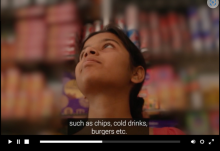How women collectives are spearheading health and nutrition initiatives

Improving nutrition for women and children remains a high public health priority in India. Women's groups are becoming important in delivering health and nutrition interventions while continuing to address gender and livelihood challenges. India’s key poverty alleviation programme Deendayal Antodaya Yojana- National Rural Livelihoods Mission (DAY-NRLM) recognized that members of its women self-help groups (SHGs) were spending their savings on health expenses, due to recurrent illness impacting their income and well-being. In response, the food, nutrition, health, WASH (FNHW) and social development initiatives were integrated within the programme. Under the DAY-NRLM programme, the FNHW interventions led by women’s collectives are focused on behaviour change within communities to adopt practices for better health and nutrition outcomes, demand generation and linkage with services and entitlements. SHGs and their federations play a key role in engaging communities by discussing FNHW topics in their regular meetings and supporting mobilisation for public nutrition and health services. On similar lines, Swabhimaan (2017-2021) a research pilot was initiated by State Rural Livelihoods Mission under DAY-NRLM in three states; Bihar, Chhattisgarh and Odisha, with an objective to generate operational know-how on how women’s collectives can be engaged in FNHW interventions. In this PoshanWeekly, we share examples from Swabhimaan sites on how DAY-NRLM self-help groups are leading change: - Women’s collectives in Odisha are driving health reforms - In Bihar student gardeners improve nutrition and health metrics - Women collectives tackle teen sex, contraception and nutrition Relevant materials on FNHW programming by women’s collectives are available in the resources section. We hope this inspires your advocacy efforts towards improved health and nutrition for women and children.




